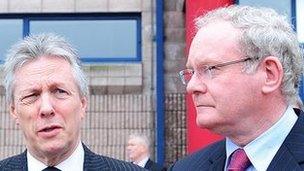Robinson and McGuinness meet amid DUP-Sinn Fein tension
- Published

Peter Robinson and Martin McGuinness will lead talks on corporation tax
Peter Robinson and Martin McGuinness will lead talks on corporation tax on Thursday, against a background of tension in their respective parties.
Indeed, the First Minister launched a scathing attack on Sinn Fein in a speech to DUP members in West Tyrone, less than 48 hours before this meeting.
Mr Robinson, speaking as DUP leader, claimed Sinn Fein's fear of the SDLP was often paralysing decisions in the executive.
"Time and time again, the SDLP takes a stance that Sinn Fein lacks the courage to oppose," Mr Robinson said.
"We have seen it on welfare reform, pension reform and parades. This has been bad for community relations and bad for government."
He was speaking on Tuesday evening to Blossomhill branch.
His reference to a power-struggle between Sinn Fein and the SDLP followed a rather heated executive meeting a fortnight ago.
The meeting began late with Sinn Fein and DUP ministers arriving in bad temper, according to one witness.
The tensions were exposed in a post-executive interview in which the DUP finance minister accused Sinn Fein of taking a Pontius Pilate style approach to the Welfare Reform bill.
Sammy Wilson and First Minister Peter Robinson were upset to learn, just before the meeting started, that Sinn Fein intended to seek a delay in the controversial bill, just days after agreeing it at a previous executive meeting.
Sinn Fein had blocked the bill for months before finally agreeing that it should go to the assembly, as there was a tight timetable and delay could have implications for the block grant.
So the DUP was surprised to hear that Sinn Fein was going to change tack in the assembly and seek a delay in the bill which involved the biggest shake-up in benefits for decades.
In his speech, Mr Robinson declared: "Such chicanery may be par for the course in the Republic, where they languish in opposition, but it is not the behaviour of a party of government in Northern Ireland."
Mr Robinson suggested Sinn Fein was taking its lead from the SDLP Environment Minister Alex Attwood.
Executive meetings are confidential but by the end of 4 October session, it was clear there had been a row as the DUP went public with their feelings.
The finance minister gave a frank interview to the BBC's political editor Mark Devenport.
One insider claims that during the meeting, Martin McGuinness was outlining his party's concerns on the Welfare Reform bill, when Peter Robinson cut in with a comment that Sinn Fein's move was "political".
The insider claimed this clash was unusual - that Sinn Fein and the DUP tend to sort out their differences beforehand.
"This was the first time I saw them tear lumps out of one another," the source claimed.
Sinn Fein Education Minister John O'Dowd and the finance minister Mr Wilson engaged in sharp exchanges as well, according to insiders.
The DUP believed that Sinn Fein was trying to push the blame for the bill onto the DUP and the Westminster government.
Indeed, in his Blossomhill speech, Mr Robinson made clear his view: "Sinn Fein wants devolution but they don't want any of the difficult decisions that come with it."
So what to make of these internal tensions? Not much, said one insider who cautioned against exaggerating difficulties in Stormont Castle.
This source pointed out it was a matter of record that there was a frank exchange of views on 4 October over welfare reform, adding: "Someone is trying to spin this relationship into a crisis or relationship break-down.
"They have a long way to go before they are as bad as David Trimble and Seamus Mallon.
"The important thing is the parties work together and they are in the same place as far as getting changes to welfare reform is concerned."
But are they genuinely in the same place as they head to London for negotiations with the Treasury on lowering Corporation Tax?
It is well-known that there is a gap between the Treasury and the executive on this issue.
The Treasury's price for lowering corporation tax in Northern Ireland may be too high.
The Treasury wants to deduct from the estimated loss of revenue from the block funding it gives Stormont.
The executive wants to make sure that it does not suffer a penalty that is higher than any revenue generated from new investment.
Various figures have been bandied about.
One executive source claimed that the Department of Finance estimates it could attract £300m in new revenue if corporation tax was lowered while the Treasury estimates the cost at £420m.
If this is true, there would be a gap of £120m.
There may yet be room for compromise between the Treasury and the Stormont ministers - particularly if Prime Minister David Cameron decides it should happen.
But here's a question: Is Peter Robinson's bottom line the same as Martin McGuinness's?
- Published17 October 2012